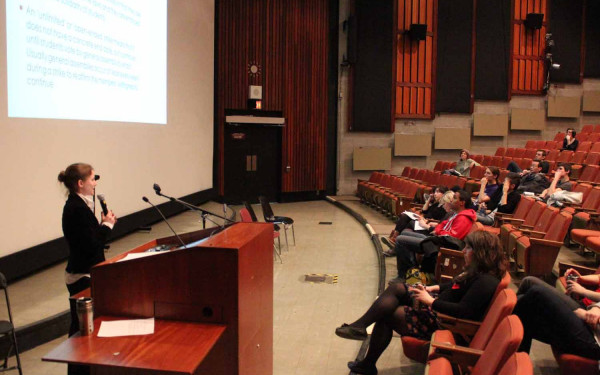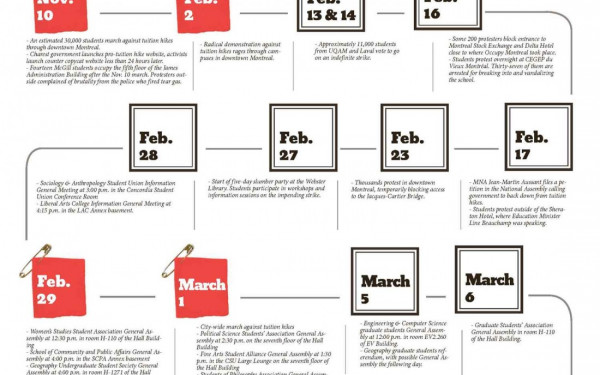CSU & GSA to Vote on Strike
Controversy Surrounds General Assembly Format
Months of protests, information sessions, Facebook arguments and efforts at mobilizing tens of thousands of students will come to a head this week as the Concordia Student Union and the Graduate Students’ Association will both decide on whether or not to strike.
The CSU and the GSA are both hosting General Assemblies for their constituents, which executives are hoping will add thousands more students to the 100,000-plus currently on strike in Quebec over impending tuition fee hikes.
The CSU general assembly will take place on March 7 at 3:00 p.m. in the Hive at Loyola campus and in room H-110 and the seventh floor of the Hall Building at the downtown campus simultaneously.
“Interestingly, a GA at Concordia is probably the first time a lot of these people will have ever voted in their life,” said CSU President Lex Gill.
There are some students who are uncomfortable with the way the assemblies are being run, however, and are calling into question the legitimacy of such votes.
“The voting process is unfair and unjust,” said Jenny Ster on the CSU’s Facebook event page for the assembly.
Ster suggested that students be allowed to vote online. “Students who work full-time, live far away, have children or go to school part-time are usually busy at 3:00 p.m. in the middle of the week,” she argued.
Gill said that voting by proxy explicitly goes against the CSU’s bylaws and would be very difficult to pull off with such a large amount of students voting at one time.
The president explained that this is also the reason that a secret ballot is not being used—there’s too much potential for the system to be exploited.
“In our bylaws, there are very specific referendum periods,” Gill said. “There’s November and the March elections, that’s when we could have a referendum, hypothetically.
“I think it’s logistically impossible [to have a secret ballot at the GA],” she continued. “Trying to make sure people didn’t have [multiple] ballots or try to photocopy the ballots throughout the meeting. There are issues of that nature.”
Another student, Howard St-Roy, was upset that students will vote by raising their hands, which will lead to a mob mentality at the assembly.
Speaking of the Fine Arts Student Alliance vote, he said, “I’m going to miss a week of class because people don’t want to be shunned by other judgmental fine arts students!”
Before the CSU and GSA vote, there will be a discussion moderated by a “neutral party” which will be livestreamed between all three voting locations. Students will have the chance to ask questions one at a time of either Gill or CSU VP External Chad Walcott. Security will be on hand at all venues to ensure the safety of all students, especially in the wake of allegations of death threats to students regarding their opinion on the strike.
“No one should feel intimidated, no matter how they want to vote,” said Gill.
The CSU is currently looking into booking overflow rooms in case the capacity of 1,200 students that these three rooms represent is exceeded.
Others on the Facebook page are upset that only 1.5 per cent of undergrad students need to show up to reach quorum, and only half of those plus one are required to put the entire union on strike—which could be as few as 226 people.
Graduate Students Vote Today
The GSA is also holding their general assembly today in room H-110 at 12:00 p.m. Graduate students will be voting on an open-ended strike to start on March 19. Students will meet at another assembly during the strike to determine whether to continue striking or not.
They will also be voting on a change to GSA bylaws that formally enshrines the General Assembly as the highest-decision making body of the organization and whether to join Le Coalition large de l’Association pour une solidarité syndicale étudiante, an umbrella Quebec student organization.
Bylaws for the GSA stipulate that one per cent of graduate students are required to make quorum—roughly 66 students.
“We’re trying to have our membership there, so we can have an effective strike,” said GSA Board of Governors’ representative Erik Chevrier about the possibility of a small turnout.
“It’s not an effective strike if we don’t have [a lot of] our membership participate,” he said.
—with files from Adam Kovac

_900_599_90.jpg)


_600_375_90_s_c1.jpg)


